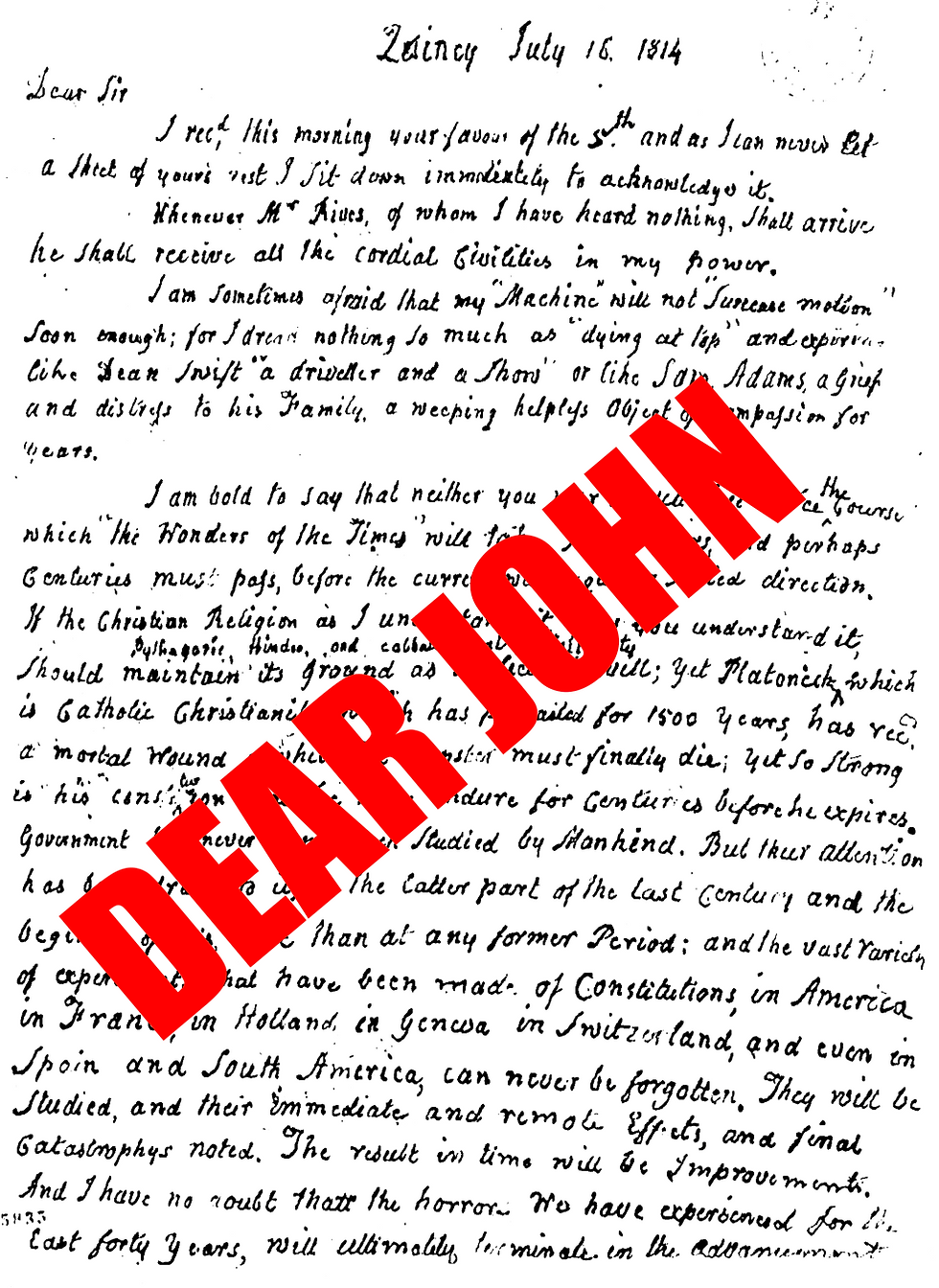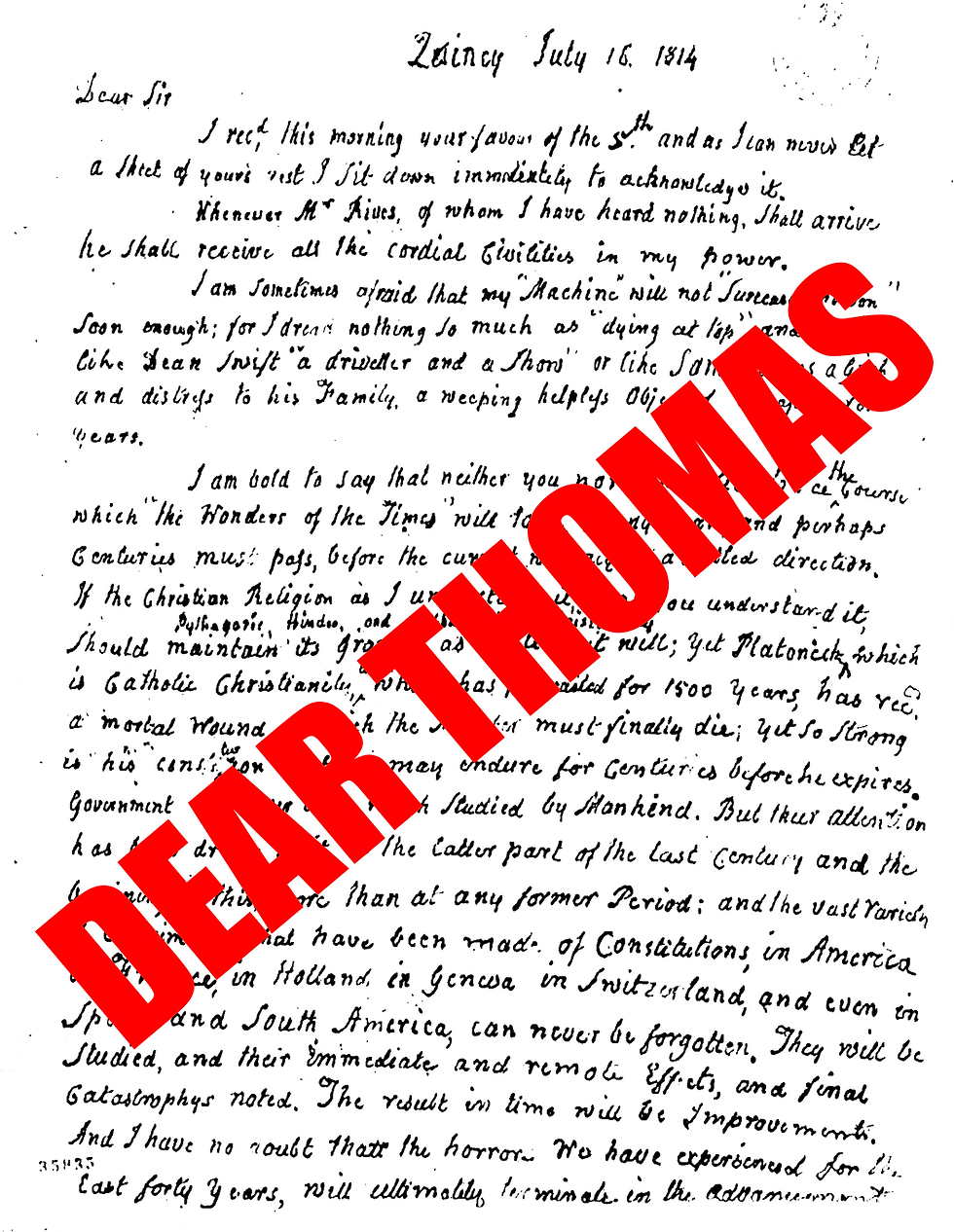"DEAR JOHN"
- Philip Drucker

- Jul 4, 2020
- 5 min read
Updated: Jul 5, 2020
By Philip Drucker

"Thomas Jefferson still survives." With these famous last words, on July 4th, 1826, John Adams, the second president of the United States died at the age of 90. With communication being what it was back then, Adams could not have known his old political rival Thomas Jefferson had already died a few hours earlier on that very same day. 50 years to the day from the signing of the Declaration of Independence.
In many ways their friends, then not friends, then friends again relationship symbolizes the heart, soul and true 1776 spirit of what we can now call the American experience.
Philosophically, the two could not have been more different. Adams was your classic Federalist. He believed in a strong central government with close ties to England. Jefferson was what was then called a Democratic Republican, big on maintaining the sovereignty of the individual states and enamored with the French philosophy of what might best be described as a country operating in constant fear of an overthrow by means of a people's revolution.
Despite their differences in height, weight, temperament, philosophy and politics, the two Founding Father's working relationship started off without any instance or indications of the negativity to come. They met in Philadelphia during the Continental Congress of 1775. By 1776 they were working together on the committee to draft the Declaration of Independence.
Despite their differences, both men openly and in written letters, some to James Madison, expressed both an intense like, perhaps even affection, and admiration for the other. It looked like the two might go down in history as the Mutt & Jeff (if they had been created yet) of the original Framers.
During the 1780s their friendship continued to blossom. While both were assigned to diplomatic missions in Europe, Adams in England and Jefferson in Paris, Jefferson's wife Martha died. Now a widower, both John and Abigail Adams took it upon themselves to console Jefferson. Abigail was quoted on occasion as mentioning Jefferson as "family."
When George Washington was unanimously elected our first Constitutional President, both men returned to America. Washington quickly named Adams as his vice-president and Jefferson as his Secretary of State. It was during this time that the realities associated with political ambition and a budding rivalry began to rear its ugly head.
For his part, Adams felt marginalized as Washington's VP, but he kept quiet. Jefferson, not so much. As a staunch supporter of the French Revolution, even after the beheading of Louis XIV and the beginning of the Reign of Terror, he could not bear Washington's decision to remain neutral in what Jefferson saw as an honorable uprising in the name of the people.
In 1793 Jefferson resigned his position and went back to Monticello. With Jefferson away, this is when the sniping, back-stabbing, rumor and innuendo between Adams and Jefferson began and it would hardly be where or how their story ended.

It began with a letter and then another. In correspondence to both his sons Charles and John Quincy, John the Elder began through a series of somewhat oblique historical references to Numa, an historical figure who upon Romulus death succeeded him as Rome's leader, and his illicit lover, the divine nymph Egeria, announced to the world, in a what would pass for scandalous gossip of its day, the ongoing affair between Thomas Jefferson and his (former?) slave Sally Hemings.
Although still far away from newspaper publication and the prying eyes of the general-public, the rumors most certainly would have been floating among the Washington elite. When George Washington stepped down in 1796, both Adams and Jefferson ran for president, with Adams squeaking out a narrow win. Although offered the opportunity to participate in a kind of bi-partisan government, Jefferson refused Adams offer, joined forces with James Madison and began waiting for, well, another day.
That day came on February 17, 1801 when Thomas Jefferson was elected the third President of the United States of America. But it was what came during the year, right up to the last day of the Adams presidency, that change the trajectory of the two men forever.
By all accounts, the election of 1800 was one for the ages. Even to this day, as nasty as they come. Jefferson, or at least his supporters, accused Adams of possessing a "hideous hermaphroditical character" while Team Adams called Jefferson a "mean-spirited, low-lived fellow." Jefferson then accused in the press, Adams, who had signed the unpopular Anti-Sedition Act of 1798, of falsely wanting to start a war with France.
Upon losing the election to Jefferson and thereby suffering the humiliation of not winning a second term (as history would record, the only Founding Father not to do so) Adams left town, skipping the inauguration in the process and did not speak to Jefferson for another twelve years.
In 1801, a series of salacious articles came out in the press about "Dusky Sally" aka Jefferson's "slave-mistress." Putting two and two together, Jefferson probably had little to no doubt who had initially let the cat out of the bag. I like to think of it as America's first official cold war and as I mention above, phase one lasted approximately twelve years.
Then, in 1809 came the first thaw in their winter of their discontent. Fellow signor of the Declaration of Independence Benjamin Rush through a series of letters reached out to both parties reminding them they were "Founding Brothers" Rush referred to a series of dreams he had regarding the two of them renewing their friendship through a series of letters.
On January 1, 1812 Rush's dream came true. Adams sent a short note to Monticello that ignited a series of letters sent over the next 14 years. In the letters, the two grappled with issues including the election of 1800, the French Revolution, and even their growing concern that America was heading towards a civil war.
Near the end, both men confessed to the comfort and happiness of their renewed correspondence. In 1823, Jefferson wrote, "But while writing to you, I lose the sense of these things, in the recollection of ancient times, when youth and health made happiness out of everything.” -Thomas Jefferson
On July 3, 1826 Jefferson fell into a coma from which he never awoke. He lingered in semi-consciousness until the afternoon of July 4, 1826. He was 83 years old.
That same day, at roughly the same time Jefferson passed, Adams lapsed into a coma. He woke up for a brief moment at approximately 5:30pm that evening, uttered his last words, and died. He was 90 years old.
For the record these two giants of our country never did meet in person again. But they died at a time knowing the country they helped found would indeed survive to fight for another day. I wonder if they watched or heard fireworks that night? You know, bombs bursting in mid-air and all that? I hope so. That would be just so darned American now wouldn't it?
Have a Happy 4th of July!
Re-Phil?
DruckerReport.com/communique
Twitter: @DruckerPhilip
Instagram: Philip_Drucker









Comments